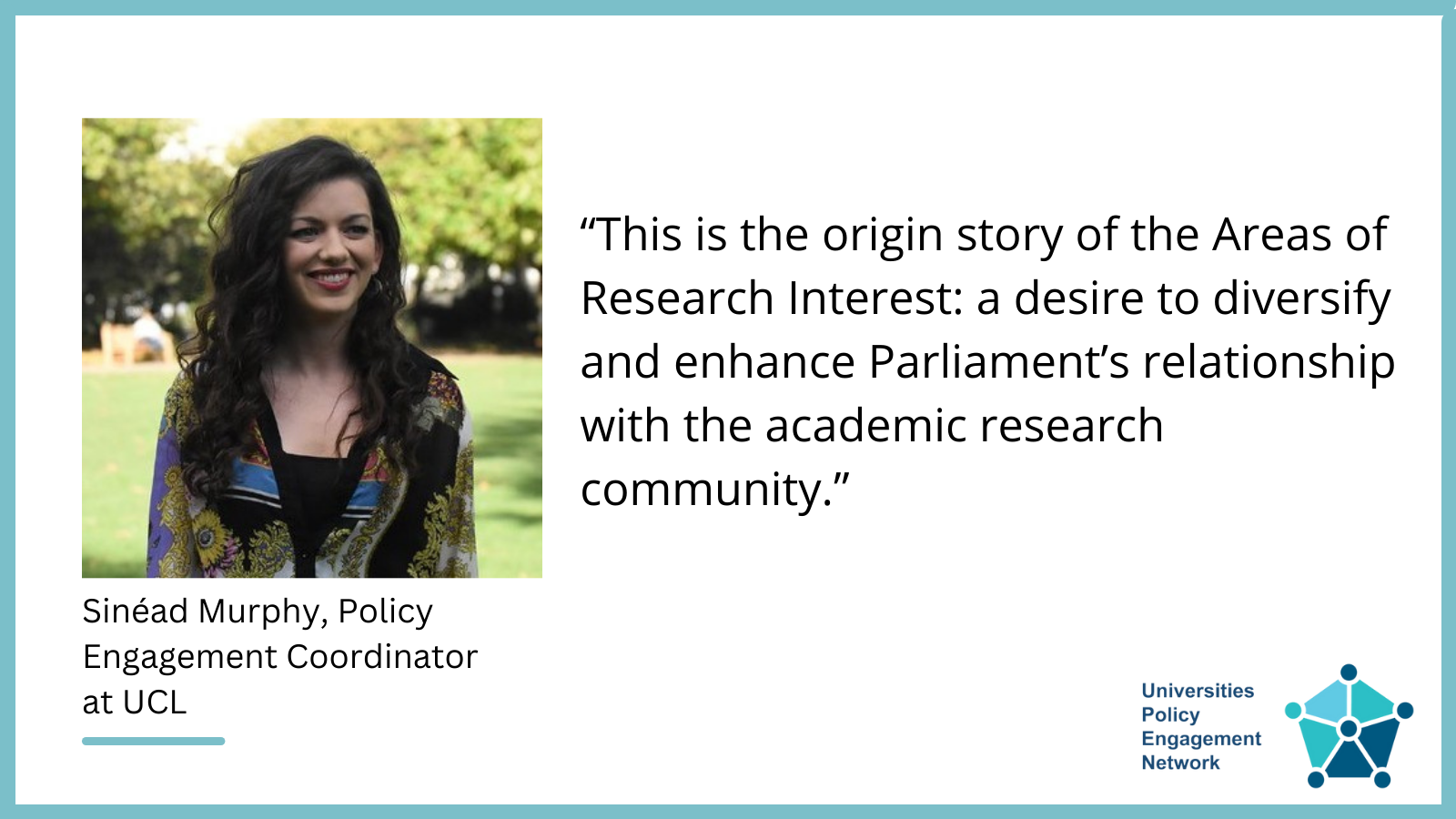Good evidence is diverse evidence: the case for Areas of Research Interest (ARIs)

See UPEN event 10 Jan 2024: Navigating Government and Parliamentary Areas of Research Interest
It is now well-established by those working in academic-policy engagement that good evidence use requires diversity: diversity of perspective, expertise, and skills. When the House of Commons explored the use of research evidence in its 2017-2019 session, however, it found a ‘lack of diversity in stakeholder engagement’ (p. 8). Notably, their report concluded that this was particularly the case ‘for the academic sector which is both underrepresented when compared to other stakeholder groups, and unrepresentative of the breadth of the academic research community’ (p.64). Select committees identified the need to reach outside the ‘usual suspects’ – to access a richer range of research expertise to better inform their evidence base.
This is the origin story of the Areas of Research Interest: a desire to diversify and enhance Parliament’s relationship with the academic research community. To meet this need, CAPE (Capabilities for Academic Policy Engagement) worked with the Scrutiny Unit within the House of Commons Select Committee Team in Parliament to develop a Policy Fellowship focussed on establishing and publishing ARIs. This fellowship was held by Rob Davies, Head of Policy and Dialogue at UCL’s CLOSER, the home of longitudinal research, and it led to the development of the first ever select committee ARIs.
Although this initiative continues to be developed, early outcomes have been positive. Just under 50% of the academics responding to The International Trade Committee’s five ARIs for 2021 had never engaged with Parliament before. ARIs for UK governmental bodies are now searchable by topic and research field via the ARI database, and ARIs have also been developed for the Senedd.
What’s behind an ARI?
As an initiative continuing to evolve, the specific ‘interest’ signalled by Areas of Research Interest can vary. ARIs can be understood as:
- Research which a particular committee wants to commission
- A reflection of the current scientific or disciplinary focus of a committee
- Suggestive of the policy portfolio and evidence needs which a committee project they will be working with over the short to medium term.
While the precise motivation(s) for articulating an ARI may not always be obvious, it can be assumed that an ARI offers a reliable insight into the kinds of conversations a department is keen to have. ARIs can therefore be understood as an invitation to dialogue, and a mechanism to support joined-up thinking.
Why engage with ARIs?
For an academic looking to communicate research evidence to decision-makers in Parliament, engaging with a relevant ARI may well help to take some of the complexity out of the process. Likewise, ARIs can be helpful in informing researchers about broad priorities areas of policy and scrutiny – information which is very useful in aligning grant applications with potential policy applications. Feedback on how research evidence is used by select committees is a known area requiring further development, but follow-up with academics who respond to ARIs is improving. Expert advice and insights provided are increasingly acknowledged in writing – a useful documentation of impact, external engagement, and research reputation. While engaging with policy can be challenging in terms of time and workload, registering research interests with parliamentary ARIs can be brief and informal. Most ARIs also include a named contact, allowing researchers to better understand who may be interested in their areas of expertise.
Pathways to academic-policy engagement
The development of ARIs is emblematic of many of the known features of and barriers to effective academic-policy engagement. Good evidence use requires commitment and coordination across policymakers, academics, knowledge mobilisers, funders and many others, usually working on cross-cutting, interdisciplinary issues. Building mechanisms to facilitate effective cooperation at this scale, and across different cultures, pressures, and paces of working, is challenging and time-consuming – but are important to ensure that decision-making is not informed by the ‘usual suspects’. Developing and refining mechanisms for academic-policy engagement are essential if we are to harness the full depth and breadth of research expertise which can inform evidence-based policymaking.










































































































